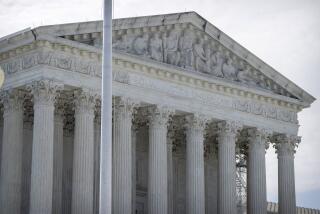Justices refuse detainees
WASHINGTON — Detainees at the U.S. military base at Guantanamo Bay, Cuba, were dealt a setback Monday by the Supreme Court, which refused -- for now -- to hear their claim that they were being denied the right to habeas corpus that is protected by the Constitution.
This right to go before a judge to determine whether detention is lawful is considered a fundamental principle of Anglo-American law, and the Constitution says this privilege of habeas corpus “shall not be suspended” except during invasions or insurrections. But the reach of this right remains in doubt. Bush administration lawyers say the right to habeas corpus does not extend to foreign-born prisoners held by the U.S. military outside the nation’s borders.
On Monday, the justices voted 6 to 3 against taking up the issue and deciding it in the current term. But the matter was more closely divided than the numbers indicate, since Justices John Paul Stevens and Anthony M. Kennedy said they voted with the majority only because the prisoners had not tried all the “available remedies” under the law.
The two justices were referring to a provision, added by Congress to defense appropriations legislation in late 2005, that said detainees held by the U.S. military were entitled to a Combatant Status Review Tribunal at Guantanamo Bay.
In these brief hearings, military officers examine whether there is evidence to hold the detainee as an “enemy combatant.” The detained men do not have a right to a lawyer, and they cannot challenge, or even see, all the evidence against them. In more than 90% of the cases, the officers upheld the Pentagon’s decision to hold the detainee.
Congress said the detainees could ask the U.S. Court of Appeals for the District of Columbia Circuit to review the decisions of these tribunals.
None of the current detainees has tried that option, which their lawyers call a sham. Because the appeals court already has ruled that the detainees have no rights under the Constitution, the detainees have virtually no chance of winning relief in that court.
Now, however, lawyers representing the Guantanamo prisoners will have to go through that lower court before they appeal again to the Supreme Court.
“What you have here is a punt for a year -- and that comes after five years of delay,” said Hina Shamsi, a lawyer for Human Rights First.
About 385 detainees captured since the Sept. 11 attacks are still held at Guantanamo.
Three years ago, the high court appeared to have cleared the way for them to challenge their detention in court. In Rasul vs. Bush, the 6-3 majority said some of these men claimed to be “wholly innocent” of wrongdoing and they deserved a right to be heard. That decision relied on the habeas statute then on the books, which gave federal district courts the right to hear applications for habeas corpus relief by anyone “who claims to be held ‘in custody in violation of the Constitution or laws or treaties of the United States.’ ”
But the Bush administration and the Republican-controlled Congress revised the law and stripped the detainees of their right to habeas corpus. That left only the issue of whether the Constitution itself protected their rights.
On Monday, Justices Stephen G. Breyer, Ruth Bader Ginsburg and David H. Souter disagreed with the court’s refusal to hear the case now. “I believe these questions [on the reach of habeas corpus] deserve this court’s immediate attention,” Breyer wrote.
Sen. Patrick J. Leahy (D-Vt.), Senate Judiciary Committee chairman, said the court’s action “underscores the need for Congress to act quickly to restore fundamental habeas corpus protection that were rolled back as part of last year’s Military Commissions Act.” However, even if the House and the Senate were to pass new legislation, President Bush could veto it.
Richard Samp, counsel for the Washington Legal Foundation, called Monday’s decision “welcome news” and said it would prevent for now “activists’ efforts to use the courts to second-guess military decision-making.”
*
More to Read
Sign up for Essential California
The most important California stories and recommendations in your inbox every morning.
You may occasionally receive promotional content from the Los Angeles Times.











